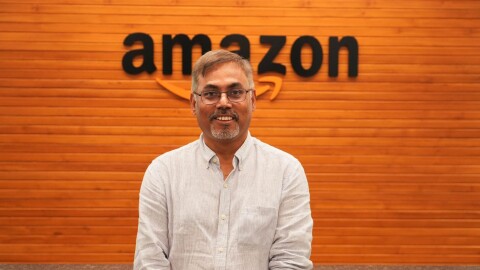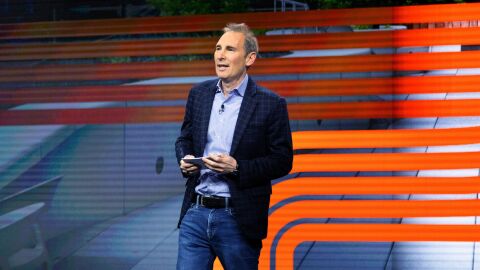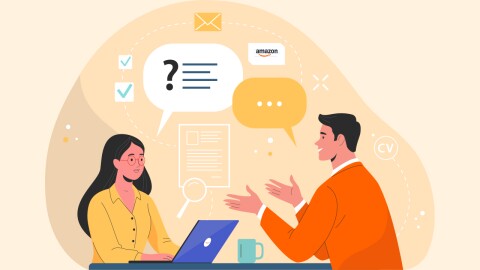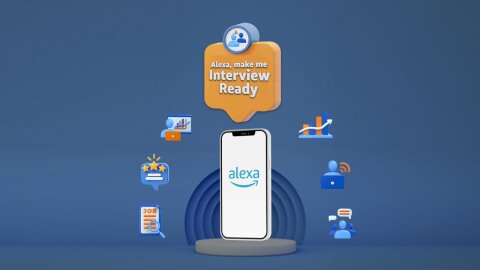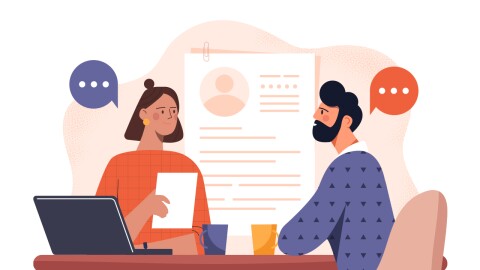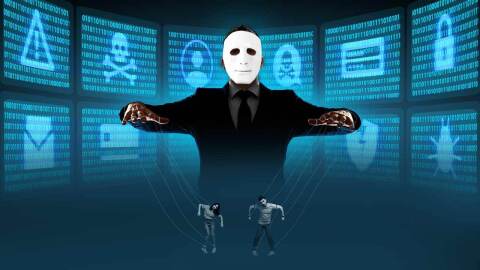
From how Amazon shortlists resumes to maintaining work-life harmony during the pandemic, from the culture of Diversity, Equity and Inclusion (DEI) to tips to potential candidates are aspiring to join Amazon, we asked Deepti Varma these and many more questions across wide ranging topics.
How has the pandemic affected work, engagement and productivity at Amazon?
Work from home (WFH) is not new to Amazon, we offered flexibility in the past too. In fact, we had pioneered the WFH concept with virtual roles and remote working even before COVID had started. As you know, we have something called the Virtual Contact Centre (VCC), where people can work from their homes. Hence, when the pandemic actually hit us, we were much better prepared than many other organisations, because we had already worked on this model of working.
Career Talk with Deepti Varma https://t.co/nq6B3CsdDy
— Amazon India News (@AmazonNews_IN) September 8, 2021
We did not see an issue with productivity, in fact, we were able to move our employees to effectively work home and we felt that it was kind of smooth for us. Apart from that, we used lot of Amazon tools. One such tool is using Connections, to get feedback on the ground as to what employees are feeling, what is the infrastructure support they need to feel more comfortable at home. In fact, I still remember we did an experiment where we decided that because people did not have too many people around them, should we use Alexa to onboard them. So we came up with Alexa Skills and chatbots to make employees feel comfortable as they came into Amazon. So, we tried out a couple of things and I think it worked out well for us.
How does Amazon support the holistic well-being of its employees?
Very relevant question and especially during the times when we have Covid, I think it is very imminent that we all take care of our health. We at Amazon believe that it is not just physical health, but also emotional, mental and financial health that we need to support our employees across. We have our internal initiative called “Svasthya”, under which we make sure that we have health check-ups, an employee assistance program (EAP), employee wellbeing, including diet, nutrition and counseling, that we offer to employees.
But we thought we should go one step forward and we actually launched a wellness app where employees can go and understand what kind of food that they should eat, what kind of exercise they should do; there are people to whom they can talk to, who can guide them, and so on and so forth. We also felt that during COVID it was a very stressful time for everyone and we felt we should give employees an outlet where they can speak. So, we came up with this Learning Circle or Listening Circle, where people would just open up and talk about all the stress that they were going through. People who had lost their family members, their near and dear ones.
In addition, one learning through the pandemic has been the importance of financial wellbeing. We felt that it was very important for us to have a financial awareness session, and we started that too. We wanted people to understand how do you save, what should you do, how should you plan your finances, etc. I think, overall, because we had a holistic approach towards employee wellbeing, it has really shown positive feedback from employees.
How does Amazon create psychological safety for its employees, whether it’s on-ground or virtual, now that many are working from home?
Let me take a step back and go with the definition of what psychological safety is. Psychological safety is basically creating an environment where employees do not fear making a mistake or voicing their opinions. As you know at Amazon one of our leadership principles is that have a backbone disagree and commit. We encourage people to show their backbone when they disagree, we encourage people to celebrate failures, we encourage people to talk about things that need a diverse perspective and diverse view and I think managers, employees, individual contributors they have imbibed this culture, so it is a part and parcel of what we do every day. You need to have a stronger backbone; you need to stand up for what you think is right. So people get trained into the Amazon culture of speaking their mind out and that for me is the best environment where people can thrive.
If I have to talk about myself, when I joined Amazon, I remember that initially I used to be very reluctant because you have to unlearn a lot of things to learn the Amazon way of doing things. But I felt that it was really interesting because while people were giving you feedback to show more backbone, they were also helping you to make that transition, which helps you to have that psychological safety—that yes, while people are giving you feedback, they’re also holding your hand to make sure that you understand the Amazon culture.
In fact, very recently, we’ve launched one of our new leadership principles called, ‘strive to be the earth’s best employer’ and that basically talks about the leaders lead with empathy, have fun at work, and make it easy for others to have fun.
We do remember that when we were going through Wave 2 of COVID, how different teams from Amazon from diverse backgrounds and different geographies came together to create that COVID Warriors group and how they helped each other during that difficult time.
I cannot agree more about our COVID Warriors team. I was so humbled when I first heard of it. I feel so happy and proud to be an Amazonian! There was no formal mechanism in place, yet people just got together and were helping each other out, which really talks about the spirit of Amazon. I really felt that I learnt so much during that period. Our strength came out during that period. And you’re very right, irrespective of which function, which background, which state they belong to, are they working remotely or wherever they are, they came together to just help. That itself was really heartening to see.
How do we look at diversity at Amazon?
At Amazon if I had to talk about diversity, for us diversity is a combination of unique skills, experience, perspective, and cultural backgrounds that make us ultimately benefit the global customers. In fact, full range of visible and invisible identities, including and not limited to, gender, race, ethnicity, nationality, physical and cognitive abilities, sexual orientation, even military status, education, age, generation, etc. In fact, unlike other organisations where diversity is synonym with just gender, for us it is unique experiences, skills, perspective and cultural background that defines us.
I can talk about my own team in HR. I have my leadership team where one of them has come from the armed forces, one of them has come from consulting, one has joined us as a pathway graduate and then moved into HR, one came from business, one came from core HR, one was a CEO of a company and then joined us and moved into HR. So, that is what makes us really diverse.
Can you tell us about some of Amazon’s DEI initiatives?
We have many. I don’t think I’ll be able to cover all, but I’ll give you a preview about some of them. We’ve been really fortunate in launching a program known as “Rekindle” for women who’ve taken a break and want to start their careers. It’s been a launchpad for many women who’ve come and taken the plunge. Some of them are in fact part of my team and so I feel really feel great that people have been able to build their career. We also have a program called a “Sunshine” program where we are trying to get women leaders from across to just engage and offer their mentorship . There are some delivery stations and virtual contact centers that are only run by women. We have programs like “Pinnacle” where we’re developing middle management women to grow into leadership roles.
When it comes to people with disability (PWD), we have a silent station in Mumbai where we offer opportunities to speech and hearing-impaired associates. Whenever I hear about it, I get goosebumps, because there’s so much of energy around that (smiles).
We have also started giving meaningful opportunities to people from the transgender community. We have had people joining our fulfilment centers, sort centers, delivery centers. We have also launched a veteran hiring program where we focus on people from the armed forces coming and joining us, especially in leadership roles.
Above all, our policies are gender neutral and rally around the LGBTQ community.
What does, ‘It’s Day 1’, mean to you?
For me, it means to never stop learning. To raise the bar continuously, and to walk backwards from the customer needs. I’d like to share that I’ve just completed 10 years at Amazon (smiles), my role was extended a bit more and now am trying to learn a new business, and every day is like Day 1! I’m learning everyday (smiles).
On that note, why did you join Amazon & what made you stay on for 10 years, and what do you look forward to?
(Laughs) I’ll be honest, when I left my last organization, I wanted to join an organization where I could relate to the culture. Firstly, I was impressed by the interview process itself, because it was such a great learning at Amazon. When I had asked the panel why they had stayed at Amazon, the most common answers were: you can take risks, you can innovate, you can speak your mind and try different things, where the sky is the limit! That really resonated with my DNA. So, it was a very easy decision for me to join Amazon.
Which Leadership Principle do you most relate to?
It’s very difficult to choose one. Each of them brings in a perspective. I feel that our latest one, being the ‘earth’s best employer’ is a good reminder of employee centricity. Customer obsession and working backwards from the customer needs has been something that really has helped me and guided me all throughout these years. At Amazon we have this concept that we have an empty chair in a meeting room and every time that chair belongs to the customer and we need to think about how we are working backwards from the customer needs. I think that one is a big anchor for me.
Now to some specific Qs from the many who are listening to you.
How long should a candidate wait for the feedback after the interview? And if the candidate does not hear back from the interviewers then what should be done?
Our target is to ensure that candidates get feedback in 2 working days after the Phone screen and 5 working days after completion of all rounds of onsite interviews. Today, about 80% of the candidates get the feedback within these timelines and at least 98% of the candidates get feedback in next few days. The teams are working hard to ensure that we adhere to the 2 day and 5 day promise for at least 90% of the candidates.
What does Amazon look for in a candidate? On what basis are the resumes shortlisted?
Amazon wants people who culturally fit into Amazon’s ethos. If a person is not culturally aligned, it gets really difficult to get comfortable in the organization. At the resume stage, recruiters look for the closest fit to the ‘must have’ and ‘good to have’ competencies as listed in the job descriptions. For candidates who meet this primary criteria, we conduct phone screens with business leaders and/or online assessments ( where applicable) are organized by the recruitment team. Once these are cleared, onsite interviews are conducted where, apart from checking for any specific functional, or niche skills, the person is assessed on this cultural fit and on Amazon’s Leadership Principles; and then we go and make a hire.
How to apply for an operations job in your organization at Varanasi?
Not just for operations jobs, but for any job at Amazon, you have to go to: www.amazon.jobs and search for opportunities there.
How to roll over from non-tech to tech jobs internally.
That’s a great question. We’ve actually launched an internal program called, “Atlas”, where people undergo self-study, and we also have classroom trainings, followed by specific projects that people can work on before transitioning into tech roles. We’ve had some very good success rates internally on this front. The program’s success has led us to double down on this initiative for our employees.
What is the biggest failure in your career and how did you overcome it?
Well there’re so many (laughs). At Amazon we really celebrate failures. I’d like to share an instance. There is a recognition portal that we had launched and we said any peer can recognize anyone else and we wanted to do it internally and we said every time a person is recognizing another one, what happens is their manager should know that the recognition is there. So there were some employees who started recognizing Jeff Bezos, so they started writing to Jeff Bezos and every time that mail would go to him, a set of leaders would also get copied in the mail. There was a bug in the system. So we had to pull the server down and debug the whole thing. It was a big disaster! But the fun part of it is that our leaders in Seattle said that its was a great learning experience!
Sometimes what we do is, when we make mistakes, we ask people to write down COEs, which is correction of errors, to find out the root cause of the mistake.
(Laughing) I think I must be one of those people who must’ve failed the maximum number of times at Amazon, which makes me what I am today. (smiles)
Where do you see yourself in the next 5 years, since you’ve already achieved so much?
I think I still have a lot to learn (smiles). At Amazon I believe that learning never stops. We not only learn from our managers and stakeholders, but also from our peers and team members. I think I’ve just started with my learning process and there’s a lot more learning to be done. We pride ourselves that we work at an organization where we make experiments. In that sense I’d want to be part of a lot of innovations for our employees that make their life simple. That’s where I see myself in the future. As our 15th Leadership Principle says, I really want Amazon to be at the top.
Your thoughts on work opportunities for students or freshers.
We have a very good program run by our student program team where they go to universities both for tech hiring as well as for non tech hiring and we go to different universities across INDIA and what we did was while we were doing this we also wanted to give an opportunity to some of the women who would like to apply across the institutes and not be restricted just because we are not going to their institute. So we launched something known as ‘Amazon Wow’. Under this program, people from across tech universities, women can apply, go through the online test and then if they are found suitable, we help them mentored and trained and eventually give them jobs. We give internships, and if they are doing well in internships, we give them full time employment.
Similarly, we also go to colleges for non-tech hiring and we hire lot of people as associates in our different businesses and I think that is a great pool for us because we have seen that a lot of people want to work and study just after graduation or post- graduation. That has been a great hiring outlet for us. We focus on both tech and non-tech hiring and we also go to premier B-Schools across India. We also have a flagship program, so you can also be a fresher and come through that and experienced persons can also come through that.
What tips would you give potential candidates who are aspiring to join Amazon
?
The first tip that I would like to give you is ‘be yourself’. Amazon does not believe that you need to prepare yourself, what Amazon believes is that you should be able to identify with the culture that we have and be able to speak your mind out during the interview. What we are looking for are people who are builders, innovators, are ready to take risks, try out new things and speak their mind out. I would suggest that you through our leadership principles to know whether you identify with those or not.
Secondly, I think its important for you to understand the role that you’re getting. So whenever a recruiter is approaching you, it is important for you to know whether you identify with that role. Go with the work that needs to be done, and not the designations that may come with it. Last, but not the least, talk to an Amazonian. Ask them about their experience. I would encourage you to do that.
What can we look forward to, on Career Day?
We have a main stage event on 16th, where we are having a fireside chat with our CEO Andy Jassy who will share his own career experiences and openly talk about how he has grown in his career. We also Amit Agarwal, the global vice president and country head of Amazon who will be sharing his journey. Then we have some of the employees who will share their own view about life at Amazon because we felt that it is important to hear from the employees as to what is a typical day at Amazon. We also have one-on-one career coaching sessions for interested candidates. If you’re interested, you can go ahead and register at the link: www.amazoncareerday.com We’ll have about a 140 Amazon recruiters who will conduct these sessions. The recruiters will offer advice on how to approach the job search process effectively, resume-building skills, and interview tips that will help candidates in their search for right jobs – at Amazon or elsewhere.
So it’s a day full of excitements. Personally, I’m really excited to watch Andy Jassy and Amit Agarwal talk.


